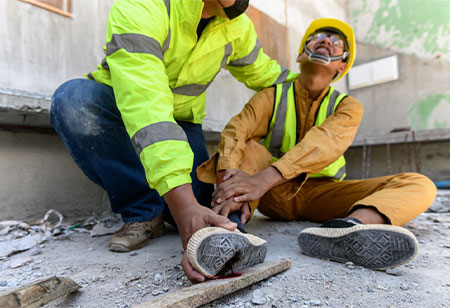
Imagine the chaos immediately following a personal injury: the blare of sirens, the rush of first responders, and your own heart pounding in confusion and fear. You're hurt, scared, and unsure of what comes next. It's a moment when vulnerability peaks, often clouded by pain and the urgent need for medical attention.
Beyond the physical injuries, you're faced with potential financial burdens, the emotional strain of recovery, and a maze of legal procedures that seem overwhelming.
This article aims to guide you through this challenging time by highlighting seven critical mistakes you should avoid after sustaining a personal injury. Armed with this knowledge, you can protect your rights and well-being as you navigate the recovery process.
Don't underestimate the value of legal advice in a personal injury case. A qualified slip and fall attorney ensures that you fully understand and uphold your rights. Lawyers are well-versed in the complexities of personal injury law and can navigate the legal system to advocate effectively on your behalf. They can negotiate with insurers, help prepare statements, and represent you in court if necessary.
Consulting with a personal injury lawyer can make a significant difference in the outcome of your case, potentially leading to a more favorable settlement or court decision.
Don't overlook the need for immediate and ongoing medical care after an injury. It's crucial not just for your health but also for documenting the full extent of your injuries. These records are vital evidence if you seek compensation later. Each visit creates a paper trail that links your injury to the accident, solidifying your claim. Without this documentation, proving the impact of your injuries becomes much harder.
Ensure you follow up on all treatments and keep detailed records of your medical appointments. This diligence supports your claim and aids in securing a just settlement.
It's essential to report your injury to the right people as soon as you can. Whether it's a car accident, a mishap at work, or an incident on a construction site, proper reporting is crucial. It triggers legal and procedural safeguards that protect your rights. If you're injured on the job, notifying your employer is a must. This starts the workers' compensation process. Consulting a construction accident lawyer can provide additional guidance specific to the complexities of construction site accidents.
Similarly, if you're involved in a vehicle accident, report it to the police and your insurance provider right away. These reports are foundational for any legal action or claim you might pursue later. They serve as formal documentation that the incident occurred, which your construction accident lawyer can use to support your case.
 Not Documenting The Incident And Injury
Not Documenting The Incident And InjuryThorough documentation of your injury and the incident is crucial. Start by taking photos of the injury and the accident scene if possible. These images can provide clear evidence of the circumstances and severity at that moment. Gather names and contact information from witnesses; their accounts can support your version of events.
Also, keep a detailed diary of your recovery process. Note your daily pain levels, mobility issues, and any activities you can't perform. This personal record is valuable in illustrating the ongoing impacts of your injury.
Be wary of speaking directly to insurance representatives without preparation. Insurers are skilled in conversations that may seem casual but are actually designed to minimize their liability. You might inadvertently say something that could be used to undermine your claim.
Before you talk to an insurer, prepare yourself. Review the details of the incident, understand your injuries, and consult with a legal advisor if possible. This preparation helps you stick to the facts without providing any statements that could be misconstrued or turned against you in your claim.
Be cautious about early settlement offers from insurers. These initial proposals may not fully cover your long-term needs, especially if your injuries require ongoing medical care or have caused permanent disability. Early offers often appeal to the immediate need for financial relief but might not account for future medical expenses, lost earning capacity, or long-term care.
Take the time to fully assess the impact of your injury with medical professionals and your legal advisor. Ensure any settlement considers all potential future expenses to avoid financial shortfalls as you recover.
Be mindful about what you share on social media after an injury. Posting details about your accident, injuries, or recovery can harm your legal case. Insurance companies and defense attorneys often monitor social media profiles to find information that could discredit your claim. For instance, a simple photo showing you at a social event might be used to argue that your injuries are not as severe as stated.
To protect your personal injury case, it's best to limit your social media activity and discuss any posts with your lawyer before sharing.
To protect your well-being and interests after a personal injury, avoid the common pitfalls discussed herein. Each of these steps is critical in ensuring you achieve the best possible outcome from a challenging situation.
Stay proactive and informed throughout your recovery. This approach helps you manage the aftermath of an injury more effectively, safeguarding your interests every step of the way.
Finally, don't go it alone. Join support groups and connect with others who have faced similar challenges. Consider the long-term impacts of your injury when making legal and financial decisions. This ensures you receive comprehensive care and support, helping you navigate the road to recovery with confidence.
We use cookies to ensure you get the best experience on our website. Read more...